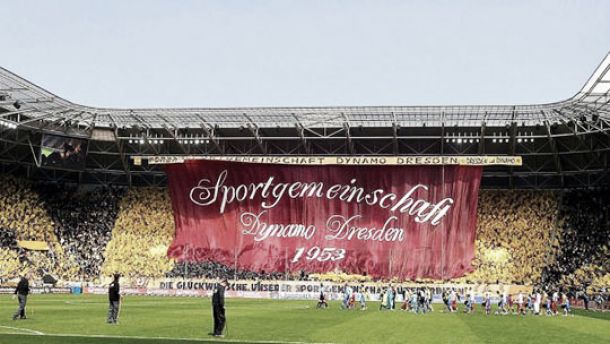It was the final day of the 2.Bundesliga season, and it was all to play for as Dynamo Dresden hosted Arminia Bielefeld in a do-or-die encounter. Both these clubs were on level points, but the visitors needed a win in order to secure the final play-off spot and avoid automatic relegation. The hosts, it seemed, had a measure of control, considering that they simply needed a draw to secure the play-off spot.
As the game got underway, one could distinctly feel the atmosphere of such an important game. Emotions were high, the fans were in full voice, tackles were flying in and the tempo was extremely high. Then, shortly before half time, it seemed that fate has dictated that Dynamo Dresden emerge victorious, as Thomas Hübener was sent off for Arminia Bielefeld after a second bookable offence. However, the visitors seemingly had not read the script and continued to attack, with Fabian Klos opening the scoring for Arminia Bielefeld.
After the interval, things just got worse for Dynamo Dresden as Cheick Gueye was given his marching orders for a second yellow card, which made this an equal match between two sides with ten men apiece. This spurred on Arminia Bielefeld and Fabian Klos completed his brace to put the visitors firmly in control and seemingly cruising to relative safety. Was this just one of those things that was meant to be? Were Dynamo Dresden simply doomed to be relegated?
Apparently not quite yet, as a furious period of end-to-end football culminated in Mickael Pote and Robert Koch pulling the hosts level, and turning the entire complexion of the game on it's head. However, the final nail in the coffin was to be delivered by the visitors, as Kacper Przybylko scored a 86th minute winner to break the hearts of the home fans. Arminia Bielefeld would have the opportunity to contest the play-off in order to keep their place in 2.Bundesliga after a remarkable final day triumph away from home.
For Dynamo Dresden, it was game over.
The fact of the matter is that the club had flirted with relegation for the past three years, and managed to survive. However, this time they would not be so lucky and will be contesting 3.Liga next season. A mid-season run of 14 games without a win deflated the squad, and despite a late fight-back of sorts there just was not enough gas left in the tank to make that final push for survival. Relegation could spell disaster for Dynamo Dresden financially, and this of all seasons was the one in which the club needed to impress and at least improve over previous seasons."Why?" would you ask."The club is, after all, operating on one of the smallest budgets in the League, and thus being a struggling second-division to third-division club is to be expected, isn't it?"
Under normal circumstances, yes, by all means. The problem is that Dynamo Dresden, before the start of the season, ran into a problem all so familiar to smaller clubs applying for a Bundesliga License; funds. This put the club in a position where there was no other option than to request financial assistance from the City Of Dresden. The City Council obliged, and agreed to offer the principal club within the City Of Dresden, Dynamo Dresden, financial support in their endeavors, which helped secure a Bundesliga License.
The funding from the City was principally used for the upkeep and running costs of the state-of-the-art Rudolf-Harbig-Stadion, which was recently renovated. The City Council has furthermore agreed to donate €500,000 for the running of the stadium. However, an immense sum of €5 million is needed each season for Dynamo Dresden to use the stadium, which just serves to illustrate the financial implications that come with relegation. Even though the club is set to receive €1.3 million due to their relegation, this is not remotely enough to cover the vast expenses that the club has. Even more damaging is the loss of Bundesliga television revenue, which in the third division is remotely in the area of a quarter of what second division clubs earn. The threat of running costs spiraling out of control is a real possibility, and the club could be plunged into a financial abyss which is near-impossible to emerge from.
The one thing Dynamo Dresden can count on is their fanatical, at times hooligan like support. Just to illustrate, even when their team was struggling, ticket sales continued to increase, with the fans all possessing a die-hard love towards their favorite club, prepared to spend their wages on watching their struggling Dynamo Dresden play. However, this income from ticket sales cannot contribute to bringing financial stability to the club, due to it all getting sucked up in stadium costs and day-to-day running costs of the club. Another problem at the club is that, over the past few years, there has routinely been changes on the Supervisory Board and other positions of power within the club hierarchy, which has damaged the stability and performance of the club even more, leading to the frustration of fans and a complete lack of on-the-field progress.
Ominously, the nouveau riche Rasen Ballsport Leipzig project is only an hour's drive West of Dresden, and having secured 2.Bundesliga football next season makes it of paramount importance for their Saxonian neighbours, Dynamo Dresden, to get back on track.
Things are beginning to become really interesting...







































